Daily Vocabulary Words: Enhance Your Lexicon with Leading Newspapers & Publications
Welcome to the Daily Vocabulary section at Wordpandit!
Our mission is straightforward: to bring you essential vocabulary words featured in top newspapers and publications worldwide. By focusing on words you’ll encounter in renowned sources, we aim to help you enhance your vocabulary effectively and practically.
Our selection includes words from:
– The New York Times
– The Washington Post
– Scientific American
– BBC
– The Guardian
– Psychology Today
– Wall Street Journal
– The Economist
– The Hindu
– The Times of India
– The Economic Times
– Hindustan Times
– Live Mint
– The Indian Express
– And many more.
We are committed to your vocabulary development. Simply visit this section regularly and explore the daily posts. This is your go-to repository for commonly used words, providing significant practical benefits by familiarizing you with vocabulary from the leading publications listed above.
Make it a habit to visit our website daily and expand your lexicon with words from top newspapers and publications. (edited)
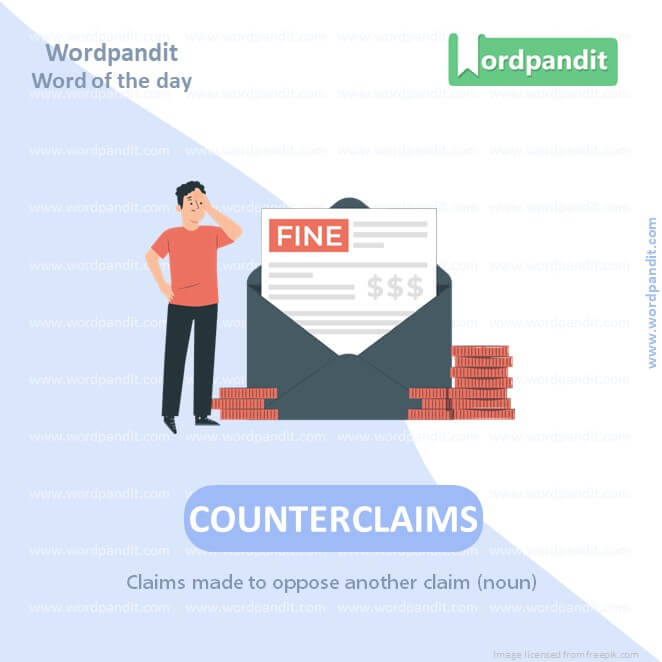
WORD 1: COUNTERCLAIMS
CONTEXT: In the heat of an election battle, it is difficult to see beyond the claims and counterclaims about tax, spending, and migration; it is clear to me that far, far more is at stake on 4 July than what is conveyed in the day-to-day headlines.
SOURCE: Guardian
EXPLANATORY PARAGRAPH: Imagine you say you cleaned your room, but your sibling says you didn’t and that they cleaned it instead. Their claim against yours is called a “counterclaim.” It’s when someone makes a claim against another claim, like saying, “No, that’s not true because…”
MEANING: Claims made to oppose another claim (noun).
PRONUNCIATION: KOWN-ter-claims
SYNONYMS: Rebuttals, responses, defenses, counters, refutations
USAGE EXAMPLES:
1. The defendant filed counterclaims against the accusations.
2. In the debate, he used counterclaims to challenge her points.
3. The legal document included several counterclaims.
4. Counterclaims are common in lawsuits to dispute the original claims.
WORD 2: PANDERING
CONTEXT: I believe he and his fellow travelers fail to uphold, that have to be fought for. By pandering to Farage, the Conservatives have been caving in to a hard-right agenda.
SOURCE: Guardian
EXPLANATORY PARAGRAPH: Imagine you really want your friend to give you some of their candy, so you start saying nice things just to make them happy and share. That’s called “pandering.” It means trying to please someone just to get what you want from them.
MEANING: Gratifying or indulging (an immoral or distasteful desire, need, or habit) (verb).
PRONUNCIATION: PAN-der-ing
SYNONYMS: Indulging, gratifying, pleasing, accommodating, catering
USAGE EXAMPLES:
1. The politician was accused of pandering to wealthy donors.
2. He was criticized for pandering to the audience’s worst instincts.
3. The movie was seen as pandering to fans of the genre.
4. She refused to engage in pandering just to gain approval.
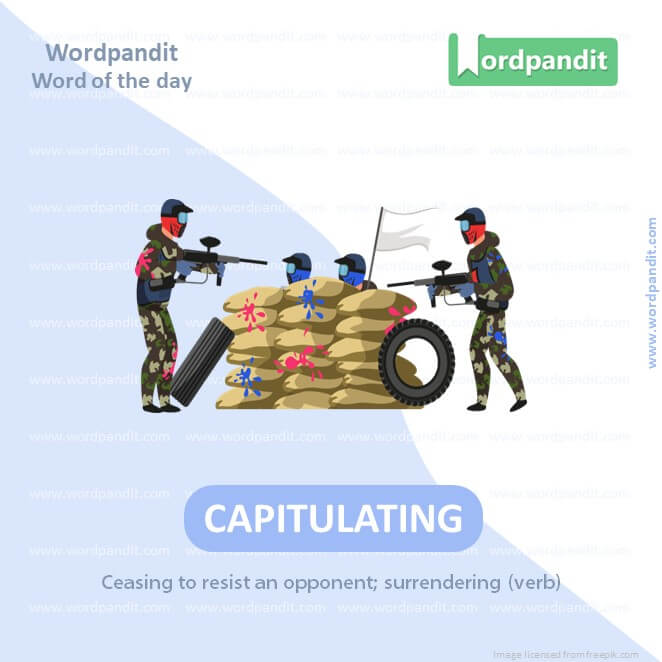
WORD 3: CAPITULATING
CONTEXT: A new and wholly inaccurate history of Britain is being written by Farage and friends, and the past few weeks have seen the right capitulating to the hard right as they divide the country between those who are the “ins” and those who are considered the “outs”.
SOURCE: Guardian
EXPLANATORY PARAGRAPH: Imagine playing a game of tag, and you’re tired of running, so you decide to give up and let your friend tag you. That’s called “capitulating.” It means giving up or stopping fighting because you don’t want to continue anymore.
MEANING: Ceasing to resist an opponent; surrendering (verb).
PRONUNCIATION: kuh-PICH-uh-lay-ting
SYNONYMS: Surrendering, yielding, giving in, conceding, succumbing
USAGE EXAMPLES:
1. After hours of negotiation, they finally capitulated.
2. He capitulated under the pressure from his parents.
3. The army capitulated after a long battle.
4. She capitulated to their demands to avoid further conflict.
WORD 4: DISTINCTIVELY
CONTEXT: The consensus that has been in place since the Beveridge report of 1942 – that together, through a distinctively British welfare state, we would prevent “the five evils” of want, disease, idleness, ignorance, and squalor – is being torn apart by Conservative vindictiveness.
SOURCE: Guardian
EXPLANATORY PARAGRAPH: Imagine you have a special way of drawing stars with a smiley face in the middle that no one else does. That’s doing something “distinctively.” It means having a special or unique way that sets you apart from others.
MEANING: In a way that is characteristic and distinguishes someone or something from others (adverb).
PRONUNCIATION: dis-TINK-tiv-lee
SYNONYMS: Uniquely, characteristically, unmistakably, notably, particularly
USAGE EXAMPLES:
1. He dresses very distinctively.
2. The artist’s work is distinctively her own.
3. The spice gives the dish a distinctively rich flavor.
4. She speaks in a distinctively calm manner.
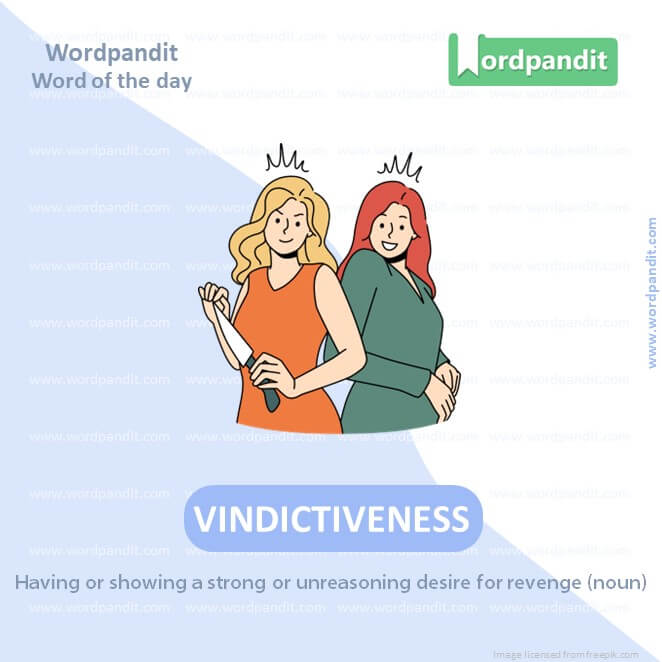
WORD 5: VINDICTIVENESS
CONTEXT: The consensus that has been in place since the Beveridge report of 1942 – that together, through a distinctively British welfare state, we would prevent “the five evils” of want, disease, idleness, ignorance, and squalor – is being torn apart by Conservative vindictiveness.
SOURCE: Guardian
EXPLANATORY PARAGRAPH: Imagine someone took your favorite toy and you decided to hide their shoes so they can’t find them. That wanting to get back at someone is called “vindictiveness.” It’s when someone wants to hurt someone else because they feel they have been wronged.
MEANING: Having or showing a strong or unreasoning desire for revenge (noun).
PRONUNCIATION: vin-DIK-tiv-ness
SYNONYMS: Spitefulness, malice, resentfulness, vindictive nature, rancor
USAGE EXAMPLES:
1. His actions were driven by pure vindictiveness.
2. The lawsuit seemed to stem from vindictiveness rather than actual harm.
3. Vindictiveness can destroy relationships.
4. She regretted her moment of vindictiveness towards her friend.
WORD 6: STIGMATISED
CONTEXT: I have never seen poor people so humiliated and stigmatised.
SOURCE: Guardian
EXPLANATORY PARAGRAPH: Imagine if someone at school made fun of someone else just because they wore glasses, making others think wearing glasses is bad. That’s “stigmatised.” It means treating someone or something as if they are not normal or bad.
MEANING: Treated by society as being disgraceful or unacceptable (verb).
PRONUNCIATION: STIG-muh-tized
SYNONYMS: Disgraced, shamed, branded, marked, condemned
USAGE EXAMPLES:
1. People with mental health issues are often unfairly stigmatised.
2. The disease was stigmatised and not talked about openly.
3. She was stigmatised for her past mistakes.
4. Efforts are being made to reduce the stigma associated with the condition.
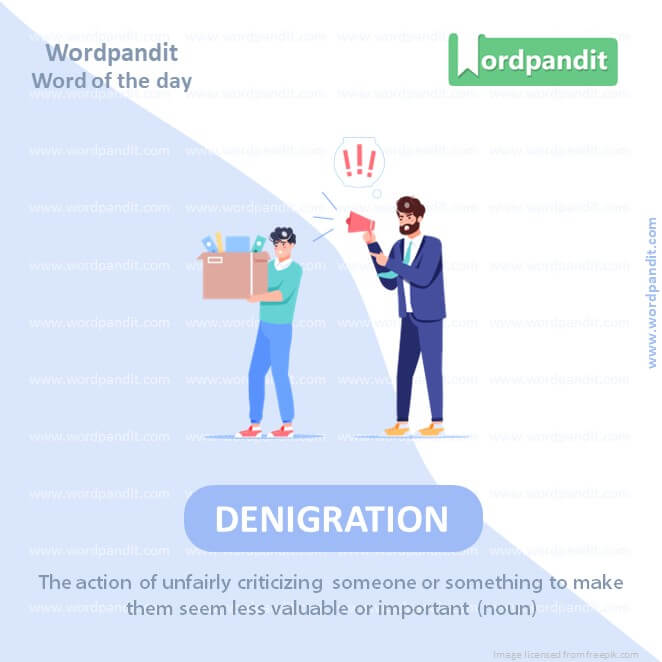
WORD 7: DENIGRATION
CONTEXT: The unprecedented way Boris Johnson prorogued parliament to avoid scrutiny and his denigration of judges exercising their constitutional function, to the attacks on the very legal instrument – the ECHR – that Churchill and his colleagues created, his successors today have systematically undermined the rule of law.
SOURCE: Guardian
EXPLANATORY PARAGRAPH: Imagine if someone said untrue things to make others think less of your best artwork. That’s called “denigration.” It’s when someone unfairly criticizes something or someone to make them seem less valuable or important.
MEANING: The action of unfairly criticizing someone or something to make them seem less valuable or important (noun).
PRONUNCIATION: den-i-GRAY-shun
SYNONYMS: Disparagement, belittlement, degradation, deprecation, slander
USAGE EXAMPLES:
1. His constant denigration of her ideas made her reluctant to speak up.
2. The article was a blatant denigration of the new policy.
3. They faced denigration from the community because of their beliefs.
4. Denigration of competitors is not an ethical business practice.
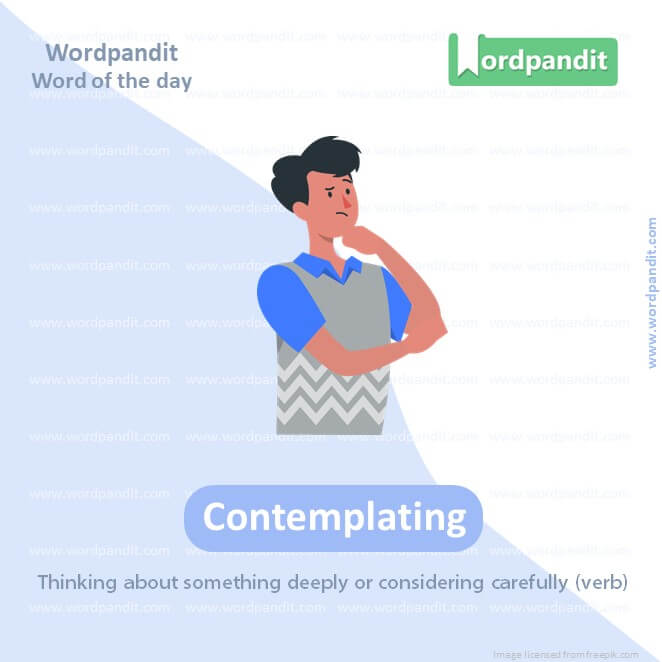
WORD 8: CONTEMPLATING
CONTEXT: The party of law and order is now contemplating abandoning the ECHR – something not even the Italian far-right prime minister, Giorgia Meloni, is planning to do.
SOURCE: Guardian
EXPLANATORY PARAGRAPH: Imagine sitting by a window and thinking really hard about what gift to make for your mom’s birthday. That’s “contemplating.” It means thinking very carefully about something, maybe even for a long time.
MEANING: Thinking about something deeply or considering carefully (verb).
PRONUNCIATION: KON-tem-play-ting
SYNONYMS: Considering, pondering, deliberating, musing, reflecting
USAGE EXAMPLES:
1. She spent the evening contemplating her decision.
2. He was contemplating a move to a new city.
3. Contemplating the meaning of the poem took some time.
4. They were contemplating whether to go ahead with the project.
WORD 9: ENTANGLEMENTS
CONTEXT: The far right wants to claim that Britain does best when we stand aloof and apart, rejecting what they call “entanglements” with outsiders on the grounds that cooperation between countries will always undermine national sovereignty.
SOURCE: Guardian
EXPLANATORY PARAGRAPH: Imagine your shoelaces got all tied up with your friend’s shoelaces, making it hard to walk without tripping. That’s like “entanglements.” It means getting mixed up in a complicated or difficult situation.
MEANING: Complicated or compromising relationships or situations (noun, plural).
PRONUNCIATION: en-TANG-gul-ments
SYNONYMS: Complications, involvements, entrapments, meshes, imbroglios
USAGE EXAMPLES:
1. He wanted to avoid any financial entanglements.
2. Their personal entanglements affected their work.
3. Legal entanglements can be very costly.
4. She found herself in a web of emotional entanglements.
WORD 10: SUCCUMB
CONTEXT: This election is about whether we succumb to pessimism or embrace hopefulness. At this election, we can either add to despair or give people hope. I choose hope.
SOURCE: Guardian
EXPLANATORY PARAGRAPH: Imagine trying not to eat a cookie that’s sitting right in front of you, but it looks so yummy that you eat it anyway. That’s “succumbing.” It means giving in to something, especially something you’ve been trying to resist.
MEANING: Fail to resist pressure, temptation, or some other negative force (verb).
PRONUNCIATION: suh-KUHM
SYNONYMS: Yield, give in, capitulate, surrender, relent
USAGE EXAMPLES:
1. He finally succumbed to sleep after the long journey.
2. Despite her efforts, she succumbed to the temptation of the dessert.
3. The city succumbed to the invaders after a brief siege.
4. She succumbed to her injuries and passed away.
Vocabulary SSC
Navigating the path to success in competitive examinations like the Staff Selection Commission (SSC) triggers a keen focus on ‘vocabulary SSC’. This collection of words, often prominent in SSC examinations, holds paramount importance, and forms a significant part of a candidate’s linguistic preparation. However, mastering ‘vocabulary SSC’ is a process that requires deliberate strategy and dedication.
To begin the journey with ‘vocabulary SSC’, a structured learning regime is key. Break the learning process into manageable chunks. Concentrate on a set number of words each day. This steady, consistent approach reduces the risk of burnout and enhances long-term retention of vocabulary.
The strategic use of memory aids can significantly boost the learning of ‘vocabulary SSC’. Utilize flashcards, memory apps, or even create personal mnemonics to help remember each word and its meaning more effectively. Associating a word to a personal event or object creates a lasting mental connection, making recall easier.
To truly master ‘vocabulary SSC’, it’s crucial to engage with the words in different contexts. Incorporating the words into daily reading and writing practices provides exposure to their usage in varied situations. This practical application reinforces the understanding of ‘vocabulary SSC’, enhancing the ability to employ these words accurately in the exam setting.
Regular revision is a must when preparing ‘vocabulary SSC’. Spaced repetition, interspersing the study with regular breaks, and regularly revisiting the words learned, ensures the words stay firm in your memory, ready to use when needed.
In essence, preparing ‘vocabulary SSC’ is an exercise in action-oriented constant learning. Strategic use of learning tools, practical application, and regular revision are key aspects of getting a grip on ‘vocabulary SSC’. As you stride through this process, you inch closer to acing your SSC examinations with an enriched vocabulary and boosted confidence.













